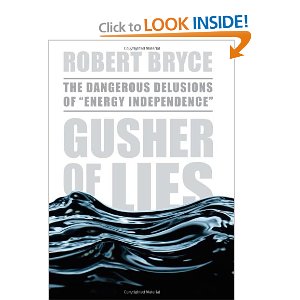
Author Robert Bryce
| By | Jon Boone (Oakland, MD USA) – See all my reviews (Oakland, MD USA) – See all my reviews |
With Power Hungry, energy journalist and Austin apiarist Robert Bryce marshals lots of accurate numbers in context to make plain how modern culture exacts power from energy to save time, increase wealth, and raise standards of living. He also dispenses common sense to citizens and policy makers for an improved environment, a better, more productive economy, and more enlightened civil society. Inspired by the environmental economics of Rockefeller University's Jesse Ausubel and the University of Manitoba's prolific Vaclav Smil, he makes the case for continuing down the path of de-carbonizing our machine fuels–a process begun two hundred years ago when we turned from wood to fossil fuels and huge reservoirs of impounded water. As the world's population continues to urbanize, people will inevitably demand cleaner, healthier, environmentally sensitive energy choices.
Today, the world uses hydrocarbons for 90 percent of its energy, getting a lot of bang for its buck. Bryce offers convincing evidence that, over the next several generations, particularly since broad energy transformations require much time and financial investment, relatively cleaner burning natural gas will provide a bridge to pervasive use of nuclear power–” the only always-on, no-carbon source than can replace significant amounts of coal in our electricity generation portfolio.” And if nuclear ultimately becomes the centerpiece for the electricity sector, which constitutes about 40 percent of our total energy use, this development would accelerate the de-carbonization of the transportation and heating sectors as well.
His narrative transcends the current climate change debate. He thinks the evidence on either side is equivocal, at best provisional, and, even if it could be proven conclusively that humans were responsible for precipitously warming the earth by producing a surfeit of carbon dioxide, there is little that could be done about the situation now that would be consequential or practical, except embrace imaginative adaptation approaches.
Bryce organizes his ideas around four interrelated “Imperatives” that serve as a prime motif for human history and explain much contemporary circumstance: power density, energy density, scale and cost. He shows that, although energy is the ability to do work, what people really crave is the ability to control the rate at which work gets done–power. Performing work faster means more time to do something else. This begets an appetitive feedback loop, where more power unleashes more time to produce more power. As the scale of this process increases, costs are reduced, making what power creates more affordable.





